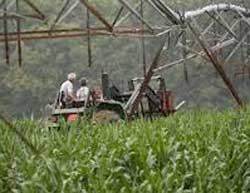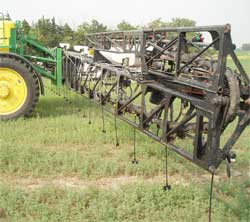With new technology, precision farming gains traction

Farm employee Andrew Isaacson sits in the cab, his main job is to monitor computer screens that control the vehicle and sprayer. "I just turn it around at each end," he says.
With computers guiding field operations he says it makes it easier in some ways but at the same time his job is more difficult. "You have to put more information into it and keep records of the data," he says.
The farm on Maryland's eastern shore is part of a growing number of precision farms that use high-technology tools to replace seat-of-the-pants farming.
GPS controls steer the tractors and cut down on or eliminate over-ploughing and overlap that wastes fuel and time. Other technologies sense just how much water is needed in a field to cut irrigation costs.
At Little Bohemia Creek, the tractor's sensors gauge the health of various segments of a field to deliver fertiliser and other chemicals more efficiently, which has an environmental benefit.
"This technology allows for more intricate data collection to make decisions," says Rich Wildman of the agricultural consulting firm Agrinetix, which provides technology advice at the farm.
"This allows the farmer to do more fertilisation or seed planting to match the needs of a field within an inch variation," he said.
Real savings, better yields
Various studies suggest farmers can save between 10% and 20% on fertiliser and chemical costs, while improving yields.

Little Bohemia Creek owner Jon Quinn, 48, is using the technology for the first time this year. The system is called GreenSeeker, and comes from California technology firm Trimble. "I don't know if I'm using less nitrogen, but I'm putting it in the right place," Quinn explained.
If that holds true, the fertiliser will mainly be absorbed by the corn instead of running off into nearby rivers.
Paul Spies of the Chester River Association, an environmental group, said Quinn is one of a handful of farmers in the pilot project, which aims to show the benefits of this technology.
"You're asking farmers to alter what they have been doing for years," Spies said. "They want to see proof that it will work."
Quinn also participates in a "precision planting" project with Monsanto, using data from his field to determine how seeds fare in different soil types.
"I download it to my iPad, and it goes to the cloud so they can see it," he said.
These technologies mean farmers need to crunch a lot of data.
"The real power is when you can take that data so farmers can see how different parts of the field produce yields and think about (crop) management changes," said Joe Foresman, a specialist with the DuPont precision farming division Pioneer.
New machines equipped with this technology
Jess Lowenberg-DeBoer, a Purdue University Agricultural Economist, said that in the past 15 years, technologies such as GPS and auto-steering have become the commonplace in mechanised farming in the United States and other countries, from Australia to Kazakhstan or Sweden.
"The economics are incredibly clear," he said. "You make gains either with higher yield or lower costs, and sometimes with improved quality."

Purdue researchers found more than 80% of US farm equipment being sold includes these technologies, which would mean hundreds of thousands of farms.
For newer technologies like soil and crop sensors, mapping and analytics, Lowenberg-DeBoer said the picture is mixed, because specialised training is needed to reap benefits. Just seven percent of US farm dealers offered sensor-driven equipment in 2013, Purdue researchers found.
"It will transform agriculture but it's not clear now exactly how it will do it," he said.
Use of drones
Also on the horizon is the use of drones to provide real-time data to farmers to pinpoint crop problems in time to fix them.
"We can detect plant problems before they are detectable by the naked eye," said Dennis Bowman, a University of Illinois crop specialist who tests drones for farm use.
But drone use is limited while US authorities study safety issues, an issue clouded by the more prominent drone applications for military and intelligence purposes.
"We would like to see common sense rules that look at the situation in agriculture," Bowman told AFP.
While corn and other grains have been the main focus of precision agriculture, Florida-based AgerPoint seeks to do the same for fruit trees and vineyards, using laser scanning to give producers data on plant health, and early hints on diseases and other problems.
"This next generation of growers want real-time access to all the data on their crops," said AgerPoint President Thomas McPeek. "The more informed the growers become, the better decisions they make and the more money they make."
The advances mean farmers need to consider upgrading equipment like tractors and combine harvesters, which give them real-time data to view on smartphones.
"They're all sceptical at first," says Bryan Peterman, a Sales Manager at Atlantic Tractor in Delaware.
"But this is a generational issue. You have the younger generation who use smartphones and iPads who are quick to adapt to the technology. But we have to show the farmers that it is user-friendly and that it saves money."
Dale Blessing, who farms on several thousand acres in Milford, Delaware, said he decided to add a combine harvester with auto-steering to his farm. The harvester sends data to the cloud and makes it available to him in real time.
"It's just more efficient," he said. "You can make more with less."
Source: AFP via I-Net Bridge
Source: I-Net Bridge

For more than two decades, I-Net Bridge has been one of South Africa’s preferred electronic providers of innovative solutions, data of the highest calibre, reliable platforms and excellent supporting systems. Our products include workstations, web applications and data feeds packaged with in-depth news and powerful analytical tools empowering clients to make meaningful decisions.
We pride ourselves on our wide variety of in-house skills, encompassing multiple platforms and applications. These skills enable us to not only function as a first class facility, but also design, implement and support all our client needs at a level that confirms I-Net Bridge a leader in its field.
Go to: http://www.inet.co.za









